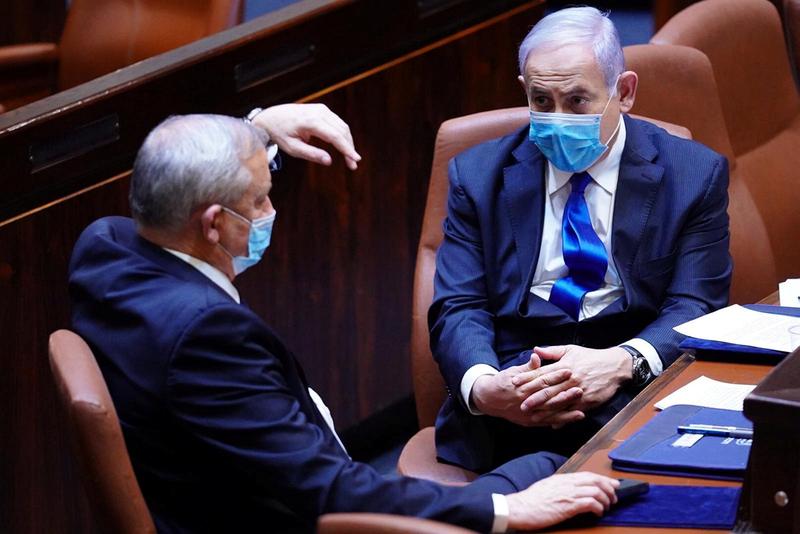FRESH AIR
Israel finally swears in national emergency government
May 18, 2020 | Ahron Shapiro

Israel’s 35th Government was sworn in Sunday, ending an unprecedented 17-month period including three consecutive deadlocked elections without achieving fully functioning government.
With no path to govern alone for either the Likud-led centre-right bloc or Blue and White-led centre-left bloc after the third election held March 2, the coronavirus pandemic provided the impetus for compromise necessary for a unity government, thus avoiding a fourth election.
The National Emergency Government was formed Sunday for an agreed-upon six-month duration to deal with the impact of the outbreak on the country – especially in the spheres of health and economy.
This government will be led by Prime Minister Binyamin Netanyahu with an Alternate Prime Minister, Benny Gantz, who will also hold the Defence portfolio. After the six month emergency period – which may be extended if necessary by agreement – the government is to be reconstituted as a national unity government under new guidelines that have yet to be negotiated.
According to an agreement signed between Netanyahu and Gantz in April, Netanyahu and Gantz will take turns as Prime Minister with Netanyahu going first, switching with Gantz on November 17, 2021, giving each leader 18 months at the helm over the next three years.
Besides Netanyahu and Gantz, 32 ministers were sworn in on Sunday, including the first female ultra-Orthodox minister, Minister of Diaspora Affairs Omer Yankelevich, and Israel’s first Ethiopia-born minister, Pnina Tamano-Shata, who will serve as Minister for Immigration and Absorption.
According to the Times of Israel, A thirty-fifth ministry, Minority Affairs, will be filled by Blue and White at a later date. However, the Jerusalem Post reported that the department will be subsumed into the Social Equality Ministry, headed by Blue and White MK Meirav Cohen, instead. It remains unclear which account is correct.
Regardless, according to the Netanyahu-Gantz agreement, as part of its evolution to national unity, the government will expand to 36 ministers, to be divided evenly between the two blocs led by Likud and Blue and White. Small parties and factions that have joined the government – such as Labor and Derech Eretz on the Centre-left and Gesher and Jewish Home on the Centre-right, as well as the ultra-Orthodox parties – need to negotiate their participation in the government with Netanyahu or Gantz, and draw from their allotment of ministries and spheres of influence.
The swearing-in ceremony was originally planned for late last Thursday night (May 14-15) but was delayed due to intra-party squabbles within the Likud over the distribution of ministries, particularly among long-serving Likud ministers who had been passed over for ministries in favour of Netanyahu loyalists with less seniority.
While some of these disgruntled Likud veterans, like Tzahi Hanegbi and Yuval Steinitz, were subsequently rewarded with ministries by Netanyahu on Sunday, others, like former Shin Bet head and Minister of Internal Security Avi Dichter and former Jerusalem Mayor Nir Barkat, were left empty-handed.
Government, Opposition make inaugural speeches
In his inaugural address to the Knesset on Sunday, Netanyahu defended against criticism that the new government, with its record number of ministers, would be economically wasteful.
“Within one year, the State of Israel underwent three elections that deepened the polarization of the people and charged a heavy price from the state coffers,” Netanyahu said.
“If they had gone to a fourth election, the cost would have amounted to NIS 2 billion. In contrast, the additional cost of the unity government is NIS 85 million per year. This cost is infinitely lower than the cost of the alternatives.”
In his speech, Defence Minister and Alternate Prime Minister Gantz focused on the achievement to compel Netanyahu to share power:
“After 11 years of reign as prime minister, you [Netanyahu] understood the voter’s verdict and decided to share with my partners and me the controls of national powers,” Gantz said. “You set a date for the day when we will swap roles. This is a statesmanlike, courageous, and important decision.”
Opposition Leader Yair Lapid – whose Yesh Atid party faction together with Moshe Ya’alon’s Telem party faction left Blue and White in late March over Gantz’s decision to enter into a unity government with Netanyahu while he is indicted for corruption charges – poured cold water on the new government, predicting the deal between Netanyahu and Gantz was destined for failure.
“This will fall apart quickly,” Lapid told the plenum. “Look at how [the government] was built – zero trust between partners… People who don’t believe a word the other says. That’s not unity. A legal agreement between people who can’t stand each other isn’t unity,” he added.
Netanyahu’s incoming government consists of more centrist parties than the one it replaces, and the Prime Minister neglected to bring most of the right-wing Yemina party into the government, settling for peeling off only one former Yemina MK, Jewish Home leader Rafi Peretz, who was named Minister for Jerusalem and Heritage.
In his speech on Sunday, Yemina leader Naftali Bennett explained his party’s decision to go into opposition, saying no serious effort was made to include it:
“[Netanyahu] wanted us to enter the coalition powerless, as ministers of affairs of nothing,” Bennett said. “When we were in the government, we were the compass and the backbone. Without us, Netanyahu has no backbone.”
Tags: Israel
RELATED ARTICLES

He survived Bondi. Now he’s fighting back: Arsen Ostrovsky addresses AIPAC conference

US Middle East strategy amid regional instability: Dana Stroul at the Sydney Institute





















